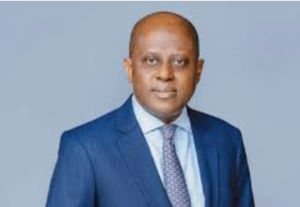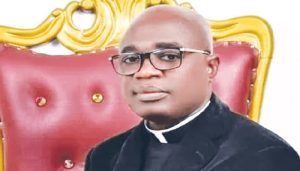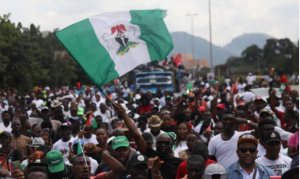For Yoruba people, it is REGIONALISM OR NOTHING!
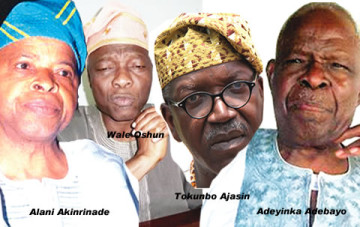
Alani Akinrinade, Wale Oshun, Tokunbo Ajasin and Adeyinka Adebayo
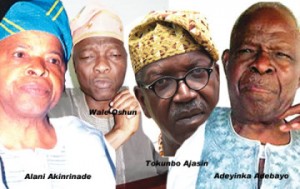
Continued from Wednesday
Without a doubt, and right from the beginning, the commitment of the North to the Nigerian nation was clearly much more apparent than that of the South.
19. The decision to amalgamate the Northern and Southern Protectorates of Nigeria was not informed by a desire or a quest on the part of the British to create a Nigerian nation-state. The concern was the quest for efficiency and rationality in colonial administration. It was meant to tackle the problem of the inability of the Northern Protectorate to balance its budget at a time its Southern neighbours had a comfortable surplus, and to settle/side-track certain areas of annoying conflict between the two administrations. This imperial self-interest was evidenced in the constitutional development efforts of the colonial master [Araoye, 2014].
20. Alhaji Ahmadu Bello strongly objected to the 1953 motion for independence moved by Mr. Anthony Enahoro. Alhaji Ahmadu Bello moved a counter motion, arguing that granting Nigeria self-rule then would amount to being recolonised, this time, by the Southerners. Alhaji Ahmadu Bello was very bitter when he was quoted as claiming that the mistake of 1914 has now come to the fore and called for the reversal of the amalgamation [Aderemi, 2013, p. 15]. In one of his essays published in 1948 Alhaji Tafawa Balewa wrote ―our concept of Nigeria is, East for the Easterners, North for the Northerners and West for the Westerners and Nigeria for all of us. (Aderemi, 2013, p. 175)
Therefore, the commitment of the North to the Nigerian nation was not apparent, it is indeed doubtful.
21. The disparity in the allocation of power to the North can be cited even from the era of Macpherson Constitution of 1951, in which of the 136 representatives that were elected, the Northern Region alone had 68 members, making it possible for the Region to dominate what should ordinarily be collective decisions (Fayemi, 2013, p.26) This raises the concern and question – was this a demonstration of apparent commitment to the Nigerian Project or the beginning of the North’s mindset of born to rule‘?
22. The manipulation of Nigerian census figure appears as another mainstay of the North – an act that raises questions about the commitment to nation building.
22.1 Festus Odimegwu – appointed as the Chairman of the National Population Commission – was criticised for reports credited to him, claiming that the country has not had any credible census since 1816. Odimegwu had blamed the irregularity on the distortion and falsification of figures for selfish and political reasons. Odimegwu was quoted as saying that, “No census has been credible in Nigeria since 1816. Even the one conducted in 2006 was not credible. I have the records and evidence produced by scholars and professors of repute; this is not my report. If the current laws are not amended, the planned 2016 census will not succeed.”
The Presidency reportedly queried Mr. Odimegwu over the statements after the then Governor of Kano State, Rabiu Kwankanso, at a meeting with President Jonathan, faulted Mr. Odimegwu‘s appointment as the NPC boss. “I also raised the issue of the Chairman of the National Population Commission headed by one Festus Odimegwu. We are not happy about that appointment, and think that it was a mistake, Mr. Kwankanso said in an interview with State House correspondents (cited in: theguardianmobile.com/readNewsItem1)
22.2 Citing an analogous example, in 1973, Niger Republic had a land mass of 1,266,700 sq km with a population of over 5m people and Chad with 1,259,200 sq km had over 4m people. So, how could the North of Nigeria that shares boundaries with Niger and Chad, with a [claimed] territorial expanse of 786,754 sq km have over 75 million people? (Fayemi, 2013, p.27) This reeks of politics of territorial expanse and not a demonstration of a commitment to the Nigerian nation.
In fact, the North subsidised the rest of the country, especially the Eastern provinces almost throughout these forty years. Chap 5, Sec 3.9, p. 21. Nigeria did not start reaping any significant contribution of the oil sector to its national income until after 1973 when the surge in the oil prices internationally as a result of the Middle East crisis produced the first oil boom. Prior to that, the North generously gave the needed fund for the development and educational need of both the eastern, western Regions and the Lagos colony…The North sacrifices its own development honestly and altruistically in the spirit of building a nation…Chap 5, Sec 3.10, pp. 21 & 22.
23. These claims are false
24. The fiscal conditions of the colonial administration in the Northern administration were dire and it survived only with the help of the imperial grant-in-aid. By 1912, the imperial hand out to the North was approximately £314,500.00. The imperial hand out to the Northern Province through the expenditure of the British taxpayers‘ money in financing a colonial territory was a contradiction of the British Colonial policy, enunciated sixty [60] years before by Earl Grey. This protocol stipulated that ―the surest test for the soundness of measures for improvement at an uncivilised people is that they should be self-supporting. So how could the North have subsidised the rest of the country? (Grey, Earl. 2010).
The Colonial Policy of Lord John Russell’s Administration, Cambridge University Press; p. 183; cited in Aderemi, 2013, p.13] and [Robinson, R. et al. 1961. Africa and the Victorians: The official mind of imperialism, London] and (Rotberg, I.R. 2006. Crafting the New Nigeria: Confronting the Challenges. Canadian Journal of African Studies vol. 40 No. 3, pp.572-575).
(The North) was left short of funds for its educational development. Its well crafted catching up plans have, ever since the collapse of the First Republic in 1966, been thwarted by underfunding from the centre and ill defined blanket national educational policies….Chap 5, Sec 3.10, 3.10.1, p. 22.
25. The North‘s current level of educational development is a consequence of the conscious decisions made by their leadership. Therefore, the claims made above are false. Okobiah [2002] provides some insights, as detailed below.
26. Islamic education was introduced and entrenched in the North with great influence, whilst Christianity – which was the herald of western formal education – had its influence in the Southern part of the country. Prior to the creation of the Southern and Northern Protectorates in 1900 and their subsequent amalgamation in 1914, the colonial administration had directed the Christian missionaries to limit their evangelical activities to the South and the non-Muslim or pagan areas of the North, because the Muslims which dominated the Northern part of the country repelled the content and process of western education. Thus, before the political and administrative advantages of western education became very attractive and worthy of pursuit by the Muslims, the Southern Christians had laid durable and self-propelling foundations and achieved considerable progress far ahead of their Northern counter-parts (Okobiah, 2002).
 27. Although some interest groups in the North have blamed the colonial administration for not having paid enough attention to the development of western education in the North, there are historical evidences to the contrary. Not only was western education repelled because of its tenets, a number of fruitless efforts were made by the missionaries and the colonial administration to introduce schools with emphasis on nonreligious and moral instruction to replace the conventional religious instruction. Under the umbrella of the Church Missionary Society (C.M.S), the Sudan Interior Mission (S.I.M.), the Sudan United Mission (S.U.M.), the Roman Catholic Mission and the Cambridge University Missionary Party, several programmes were designed to facilitate the enlistment of the children of the Muslims to western form of education without necessarily aiming to convert them to Christianity.
27. Although some interest groups in the North have blamed the colonial administration for not having paid enough attention to the development of western education in the North, there are historical evidences to the contrary. Not only was western education repelled because of its tenets, a number of fruitless efforts were made by the missionaries and the colonial administration to introduce schools with emphasis on nonreligious and moral instruction to replace the conventional religious instruction. Under the umbrella of the Church Missionary Society (C.M.S), the Sudan Interior Mission (S.I.M.), the Sudan United Mission (S.U.M.), the Roman Catholic Mission and the Cambridge University Missionary Party, several programmes were designed to facilitate the enlistment of the children of the Muslims to western form of education without necessarily aiming to convert them to Christianity.
For example, Dr. W.R. Miller of the Party Movement planned to establish schools whereby moral instruction would replace religious instruction for the children of the Emirs and their chiefs. The Emirs were solicited to send two children of their recognised families in the provinces to the school under the supervision of Dr. Miller. The school was to be experimented for a period of one year subject to a review by a joint committee of the Emirs. The school opened in 1907 in Zaria but none of the sons of the emirs from the provinces were present for enrolment. At the end, the Emir of Zaria had to send only fifteen children from some families within the town of Zaria. There were several cases of non-response to the programmes designed to enable the Northerners take advantage of the emergent western education (Okobiah, 2002)
28. Even if the case against the colonial masters was to be sustained what efforts had been made since the political independence of 50 years ago? The realisation that there was educational imbalance between the North and South justified the argument by the Northerners that political independence should not be granted in the 1950‘s. However, it was the Southern states under the Action Group political party in the Western region that launched the first free primary education for its communities in 1955. In 1957, the Eastern region launched a similar programme. These singular educational policies of both the then Western and Eastern regions created further impetus for increased primary enrolment, which in turn triggered massive increase in secondary school enrolment of the 1960‘s and the chain effects of undergraduate enrolment of the 1970‘s to the advantage of the South. By 1960, when the primary school enrolment in the North was only 282,849 pupils, the figure for the South was approximately 2,629,770, accounting for 90.1% of the national, noting that the South had only an estimated 44.3% of the nation‘s total population, as at that time (Okobiah, 2002).
29. Before the Federal Government launched the Universal Primary Education in 1976, all the states in the North and South were requested to submit their input needs to ensure successful take-off and sustenance of increased primary school enrolment. It is therefore a puzzle that after 22 years of the Federal UPE Scheme, primary school enrolment in the North was still under 65% on the average with some states below 20% by 1998 (Okobiah, 2002).
30. The Federal Government then re-lunched another version of the scheme, Universal Basic Education in 1999 in Sokoto – the same state where the 1976 version was lunched. Was that an historical coincidence or a design to remind the people of their inability to accept western education? The answer is simple. Whereas in the South, community leaders and parents advocated that the government should build more schools, in the North the governments have failed to persuade parents to send their children to school (Okobiah, 2002). Page 31 of 90
31. To bridge this educational gaps and differences, quota systems was introduced by the federal Government. An example is the JAMB Quota System, where;
* 30% of the total admission was allocated to catchment areas
* 40% to merit
* 20% to educationally disadvantaged groups and
* 10% to university discretion [Obielumani, 2008]
Adeyemi (2001) in his study on, “Equality of access and catchments area factor in university admission in Nigeria,” was of the opinion that the catchment area policy for admissions into Nigerian higher institutions of learning should be maintained because it is aimed genuinely at balancing the educational imbalance between the North and South (Obielumani, 2008). However, Professor Sarror, a former Vice Chancellor of Ahmadu Bello University was reported in the National Concord newspaper of Friday, June 3rd, 1994, as saying that eligible candidates in the Northern states could not fill up the quota for catchment area. He further said that ―in most cases, the educationally disadvantaged states could not present qualified candidates to fill up their 20% quota because all the candidates have been absorbed in the catchment area quota. This has led to a situation in the words of Adeyemi (2001) “where some universities are under-enrolled while some are overpopulated, thus leading to underutilsation and over-utilisation of resources respectively. The rational question arising from this is: must some sections of the country stagnate educationally while other sections are not moving? (Obielumani, 2008)
Good Governance
Statement of issue(s)
1. Good governance is based on a form of social contract between the governed and the governor. It is a link between manifesto and implementation of policies. It suggests that government should be run in a manner that is compatible with democratic standards and in a way that the governed should not be exploited by the governor.
2. Nigeria is experiencing a rise in political disengagement. Political participation has declined and is unequal, strengthening the voice and influence of the affluent over the masses. Membership of political parties has deteriorated, making them – and the elites that run them – more remote and disconnected from the citizens. The influx of money into politics has led to a narrowing of routes into political engagement, whilst politicians are held in contempt by large sections of the society.
3. The capacity to govern effectively and demonstrate a level of responsiveness necessary to maintain public trust in politics is being tested by a number of trends. For instance, the ethnic slants of existing political parties, alongside electoral volatility and widening geographic fragmentation of political support for the main political parties in Nigeria mean that political consent is harder to achieve.
4. One of the root causes of political disaffection is the widespread belief that democratic politics has become too captured by the interests of powerful elites, who are insufficiently responsive to the wider citizenry. The recent wave of institutional crises experienced across some Nigerian public institutions – NNPC, CBN, Ministry of Aviation etc – has exposed what happens when popular representative democracy becomes so hollowed out that the space for good governance becomes dominated by networks of powerful but increasingly unaccountable elites. Increasingly, institutions are not held accountable for their actions and the balance of power is being tilted away from ordinary citizens.
5. As a result, Nigeria is synonymous with bad governance. Some examples; Nigeria is rated 144 among 177 countries by the 2013 World Corruption Index. Transparency International rates Nigeria 8th most corrupt nation in the world4. The 2012/2013 World Justice Project [WJP] – of 96 countries in the report, Nigeria’s executive arm of government was ranked 74th in relation to observing the rule of law and the Nigeria‘s criminal justice system was ranked 94th.
6. These issues should prompt hard thinking about how a Nigerian government would govern in the future as one of the implications of the absence of good governance is corruption and all its attendant social disorders.
Contexts
7. Governments everywhere face a daunting paradox. On the one hand, they operate in an increasingly complex environment and are expected to deliver on policy objectives. In a world characterised by macroeconomic uncertainty, rapid social change, and technological innovation, citizens’ expectations of what government ought to deliver are rising. This is coupled with the intensity of the 24/7 media and the relentless pressures governments come under to demonstrate their worth, whilst public trust in government is eroding [Edelman, 2012]. Against this backdrop, governments need to do more with less and they must do so in highly visible ways, if they are to regain the support and trust of their citizens.
8. Governance in Nigeria is largely coloured by ethnicity, religious inclinations, party affiliations and other social sentiments, other than objectivity and efficiency, and thus engender poor government practices. For example, the drive for high standards of customer service – through a national initiative – Servicom – was inattentive to the role of public services in enabling people to forge relationships with each other and a sense of common purpose.
9. The solution to poor governance is Constitutional Governance, and the values that underlie it. The Constitution of any country must sufficiently and unambiguously define and regulate standards expected of government. The past decade has highlighted many lacunae in Nigeria‘s Constitution that impeded entrenchment of good governance practices, leading to a breakdown in ethics and accountability across critical public institutions. The allure of instant gratification has displaced a focus on long-term results. This breakdown has eroded the underpinning values of constitutional democracy – fairness, equal opportunity, justice, responsibility – and these democratic values are critical for good governance (Harshbarger, 2012).
Policy recommendations
*Nigeria needs a new Constitution that will entrench constitutional democracy and help to develop and enable its core values, and the nation must accept that there is an important, valuable, and honorable role for good governance – a government of, by, and for the people—that will ensure that citizens participate in a democratic society (Harshbarger, 2012).
*The content and practice of good governance in Nigeria must be as stated by the UN. This will require a new constitution for Nigeria, rather than mere amendments of the existing one. Each federating units should be empowered by a new constitution to implement good governance, with cognisance to their cultural values (e.g. Yoruba‘s Omoluabi).
*Good governance in Nigeria must operate within the framework of a constitutional democracy and the civic, societal and ethical culture that it reinforces. This framework – in which a strong civil society is the basis of a democratic society, will require the government to establish a system of democratic values such as honesty, information, transparency, and accountability.
*Nigeria should adopt a parliamentary system of government as it enables the government to gain the confidence of the citizens. It will also engender a paradigm shift from personality to political ideologies and this will challenge the nation‘s practice of inclusive and participatory democracy. Popular among contemporary political theorists, is the view that Nigeria should establish a deliberative democracy: a democracy in which laws and policies reflect the outcome of public reasoning about what is best for the citizenry‘s common good (Lodge, 2014).
*Access to political power needs to be radically democratised in order to make it work for the people. In the Nigerian context, this means: reforming party funding and exposing the lobbying world to much greater scrutiny, guaranteeing the independence and civic accountability of anti-corruption, electoral, and judicial institutions. It calls for transparency and accountability in Nigeria‘s oil and gas industry; it demands that the offices of Attorney General and Accountant General of the Federation should become independent; it demands that the oversight functions of the legislature be strengthened; and that there must be stiff and deterring penalties for betraying public trust and reneging on the terms of social contract. It also underlines the need for significant devolution of power to federating units – as the more power is devolved to the federating units, the less vulnerable it is to power being captured – and the easier it is to open up politics to citizens.
Conclusion
*Innovative governments across the world are making it easier for citizens to access public services. The most forward-thinking governments are starting to master the shift from simply administering services to regularly engaging and empowering citizens, involving them in the design – and, in some cases, the delivery – of these services. This shift is not just about increasing choice and wellbeing; it is also about boosting government productivity, whilst ensuring good governance.
*Good governance requires political appetite and willingness to reform. It requires the readiness to try things that have not been tried before, and to quickly jettison ineffective ways of working. But the payoff – effective, affordable government that can better fulfill its multifaceted missions – is worth the effort.
*The National Conference should, therefore, make constitutional provision, in a new constitution, for good governance.
*Devolution of power from the federal to federating units should be non-negotiable.
*The National Conference should achieve the establishment of a leaner Federal Government with reduced responsibilities, and federating units with greater autonomy to control their revenues and their development.
*To keep Nigeria strong, its federating units need to be strengthened not weakened. With this, we would have been able to restructure and renew our federalism.
Conclusion
The Yoruba Nation has always been sufficiently orientated to the realities and struggles in and of Nigeria. Yoruba people arrived in Nigeria, as a strong urban civilisation that had predisposed us to much openness – in political life, to free discourse, free contests, free choices, societal independence, the individual prides in his worth – what the Western world calls democratic behavior and Yoruba people call Omoluabi.
Part of that openness is that Yoruba people concede the right of individuals to practice the religion of their choice – we do not quarrel or fight over religion. Yoruba people accept foreigners and non-indigenes into their midst and are hospitable to them and, if they desire to live with us or stay longer, to absorb them into our communities. Yoruba people are sympathetic towards, and supportive of enterprise and the enterprising person – irrespective of their ethnic nationality. As a nation and a people, Yoruba are confident and fearless, and possess an acute sense of justice with clear definition of vision and leadership.
These were the value system Yoruba race came with into the amalgamated Nigeria and these are the values Yoruba aim to retain and sustain in a truly federal Nigeria.
For Yoruba people, it is REGIONALISM OR NOTHING! PUNCHNG
![]()



